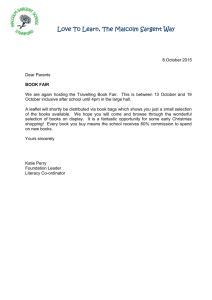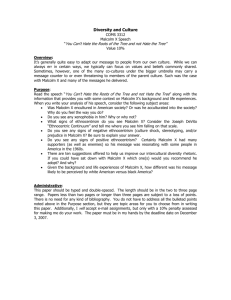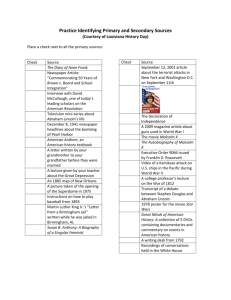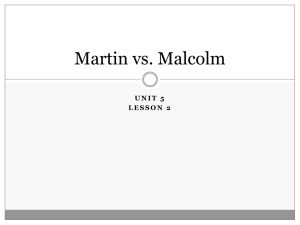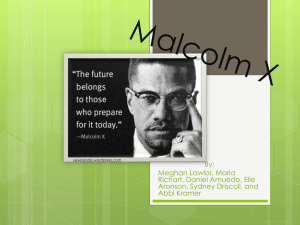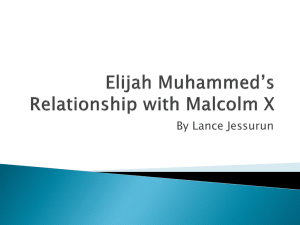Winter
advertisement
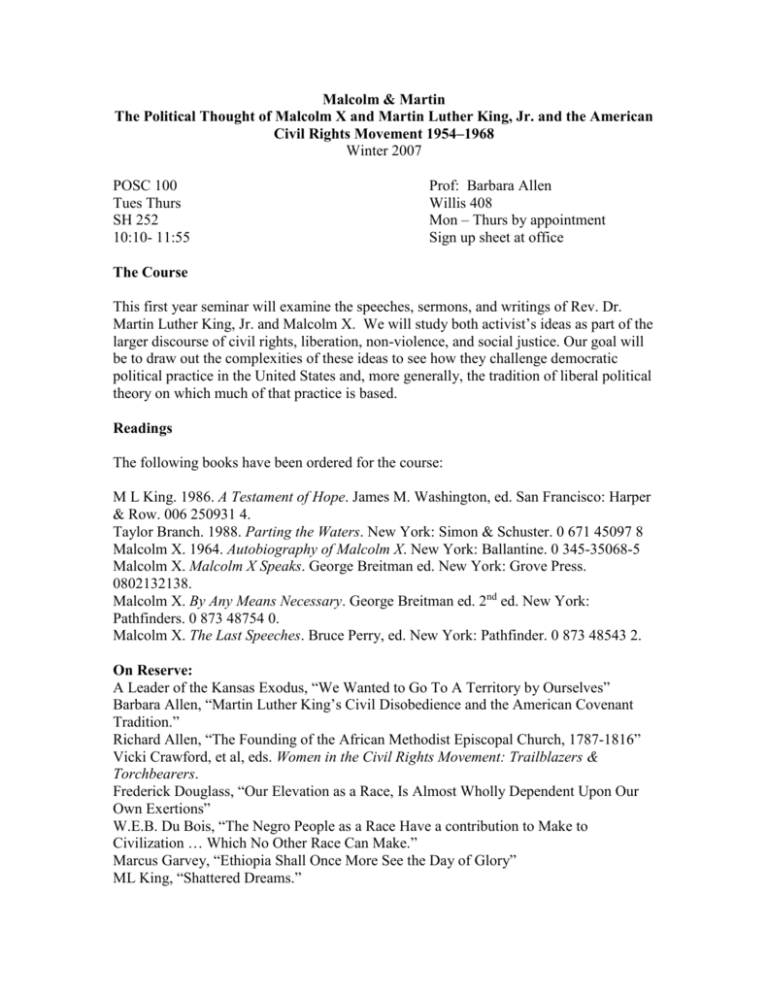
Malcolm & Martin The Political Thought of Malcolm X and Martin Luther King, Jr. and the American Civil Rights Movement 1954–1968 Winter 2007 POSC 100 Tues Thurs SH 252 10:10- 11:55 Prof: Barbara Allen Willis 408 Mon – Thurs by appointment Sign up sheet at office The Course This first year seminar will examine the speeches, sermons, and writings of Rev. Dr. Martin Luther King, Jr. and Malcolm X. We will study both activist’s ideas as part of the larger discourse of civil rights, liberation, non-violence, and social justice. Our goal will be to draw out the complexities of these ideas to see how they challenge democratic political practice in the United States and, more generally, the tradition of liberal political theory on which much of that practice is based. Readings The following books have been ordered for the course: M L King. 1986. A Testament of Hope. James M. Washington, ed. San Francisco: Harper & Row. 006 250931 4. Taylor Branch. 1988. Parting the Waters. New York: Simon & Schuster. 0 671 45097 8 Malcolm X. 1964. Autobiography of Malcolm X. New York: Ballantine. 0 345-35068-5 Malcolm X. Malcolm X Speaks. George Breitman ed. New York: Grove Press. 0802132138. Malcolm X. By Any Means Necessary. George Breitman ed. 2nd ed. New York: Pathfinders. 0 873 48754 0. Malcolm X. The Last Speeches. Bruce Perry, ed. New York: Pathfinder. 0 873 48543 2. On Reserve: A Leader of the Kansas Exodus, “We Wanted to Go To A Territory by Ourselves” Barbara Allen, “Martin Luther King’s Civil Disobedience and the American Covenant Tradition.” Richard Allen, “The Founding of the African Methodist Episcopal Church, 1787-1816” Vicki Crawford, et al, eds. Women in the Civil Rights Movement: Trailblazers & Torchbearers. Frederick Douglass, “Our Elevation as a Race, Is Almost Wholly Dependent Upon Our Own Exertions” W.E.B. Du Bois, “The Negro People as a Race Have a contribution to Make to Civilization … Which No Other Race Can Make.” Marcus Garvey, “Ethiopia Shall Once More See the Day of Glory” ML King, “Shattered Dreams.” Elija Muhammad, “Separation o the So-Called Negroes From their Slavemasters’ Children is a Must” Daniel Payne, “The Contribution of the Negro Church.” James H. Cone, “Nothing but Men,” Martin and Malcolm In America. Cornel West, “Malcolm X and Black Rage,” Race Matters Course Requirements: The lives and works of Martin Luther King and Malcolm X are said to reflect two traditions of African American thought: an “integrationist” approach to civil rights with the goal of inclusion in the public and political life of a liberal democracy (ML King) and a “separatist” or “nationalist” ideal of liberation from an (inevitably) oppressive, hegemonic Euro-American culture and political regime (Malcolm X). The actions inspired by ML King and Malcolm X are furthermore placed in contrast according to their core beliefs (philosophy, religion, and ontology informing their course of action) and their strategies for confronting injustice, especially their positions on non-violence and self-defense. Yet, if we look beyond these obvious dimensions of contrast, we find several significant perceptions — sources of hope and despair — shared by the two activists. In fact, the differences in their experiences and actions might be seen as part of a larger matrix of response — ideas and initiatives raising questions about citizenship and self-government in the context of American democracy. We will take up the complex ideas and questions raised by King and X in class discussion and individual writing assignments. Both activists emphasized thinking and doing in community, and our examination of their work will likewise stress the importance of preparation (by reading, listening, and speaking) and participation (by writing and taking part in the larger discourse of campus life). In addition to coming to class prepared to talk about the reading assignments and events in the world, I ask you to write two (3-5 page) essays, one focusing on King’s ideas and the second focusing on the views of Malcolm X. In each case the assignment is simply to write about some specific aspect of each “philosophy” of interest two you. The third assignment will ask you to take these ideas “beyond the books” to look at more of the history of the Civil Rights Movement though the eyes of the “rank and file” activists. We are lucky to have recorded and transcribed oral histories from many of the participants in the Albany, Georgia Movement. These oral histories will be available for everyone to use in writing the final paper for the class and the legacy and contemporary meaning of the Civil Rights activism in the U.S. today. Grades will be computed as follows: Seminar Participation Essays 30% each Total 10% 90% 100% Topics for Discussion and Reading Assignments: Part 1 The Cultures of Jim Crow Thurs Jan 4 Introductory Overview of American Democracy and Legal Impediments to Equality Presentation covers the following documents Declaration of Independence (1776), U.S. Constitution Art. I, Sect. 2; Art. II, Sect. 9; Art. IV, Sect. 2 (1789), Fugitive Slave Act (1793), Dred Scott (1856), Reconstruction Amendments, Civil Rights Act (1866 & 1875), Black Codes, Slaughterhouse Cases (1872), Civil Rights Cases (1883), Plessy (1896), Brown (1954) Tues Jan 9 Slavery, Segregation, the Black Church and the Social Gospel Movement Read Branch Ch1–2; R. Allen, “Founding of the AME,” Payne “Contributions of the Negro Church” Part 2 King’s Political Thought Thurs Jan 11 Civil Disobedience, Constitutionalism, and Christianity Read MLK “Letter from the Birmingham Jail” Branch Ch 3–4 Tues Jan 16 Civil Disobedience and Federalism Read B. Allen “MLK’s Civil Disobedience and …Covenant” Branch 5–6 Thurs Jan 18 Montgomery and Nonviolent Direct Action Read MLK Stride Toward Freedom, “Nonviolence and Racial Justice,” “The Most Durable Power,” “The Power of NonViolence,” “An Experiment in Love,” “Our Struggle,” “Walk for Freedom” “My Trip to The Land of Gandhi,” “Love, Law, and Civil Disobedience,” “The Social Organization of Nonviolence” Branch Ch 7–9 Tues Jan 23 King on Equality, Justice, and Political Liberty Read MLK “A Testament of Hope,” “Equality Now: The President Has the Power,” “The Case Against Tokenism,” “If the Negro Wins, Labor Wins,” “The Ethical Demands for Integration” Read MLK “Facing the Challenge of a New Age,” “The Rising Tide of Racial Consciousness,” “Give Us The Ballot,” “Remaining Awake Through a Great Revolution,” “Black Power Defined” Branch Ch 10–11 Thurs Jan 25 King on History, “Race,” the Individual, and Social Progress — and Obstacles Overview of Oral Histories Read MLK “Bold Design for a New South,” “Behind the Selma March,” “The Current Crisis in Race Relations,” “Who Speaks for the South,” “Next Stop: The North,” Where do We Go From Here?” “Transcript of ‘Meet the Press’” Branch Ch 12–13 Tues Jan30 Love as Power and the Beloved Community as Political Community — beyond desegregation, beyond America Read MLK “Suffering and Faith,” “A Gift of Love,” “I see the Promised Land” From Strength to Love, “Love in Action,” “Love Your Enemies,” “Three Dimensions of a Complete Life,” “What is Man?” “Shattered Dreams,” (reserve) Branch Ch 14–17 Thurs Feb 1 The Beloved Community as Political Community—Beyond Desegregation, beyond America “I Have a Dream,” “Nobel Prize Acceptance Speech,” “A Time To Break Silence,” Discuss Albany Oral Histories Branch 18–23 ******************** Essay One Due in Class ************************* Mon Feb 5 MIDTERM BREAK Part 3 Malcolm X’s Political Thought Tues Feb 6 Jim Crow in the North and Black Nationalism Read Autobiography: Intro, Ch 1–9, On Reserve: Douglass “Our Elevation as a Race,” A Leader of the Kansas Exodus, “We Wanted to Go,” Garvey, “Ethiopia Shall Once More,” Dubois, “The Negro People” Thurs Feb 8 The Nation of Islam and American Democracy Read Autobiography 10-19, epilogue, “Ossie Davis on Malcolm X,” Elija Muhammad, “Separation of the So-Called Negroes” Tues Feb 13 Malcolm X on Equality, Justice, and Political Liberty Read from Malcolm X Speaks: “A Message to the Grassroots,” “A Declaration of Independence” “With Mrs. Fannie Lou Hamer,” “To Mississippi Youth,” “Prospects for Freedom in 1965,” “After the Bombing” Thurs Feb 15 Malcolm X on History, “Race,” the Individual, Society, and Political Institutions Read from Malcolm X Speaks: “The Ballot or the Bullet,” “The Black Revolution,” “The Harlem ‘Hate-Gang’ Scare,” “Confrontation with an Expert;” from By Any Means Necessary: “Answers to Questions at the Militant Labor Forum,” “Harlem and the Political Machines,” “Founding Rally of OAAU,” “Second Rally of OAAU,” “Homecoming Rally of OAAU;” from Last Speeches: “20 Million Black People …,” “America’s Gravest Crisis Since the Civil War” Tues Feb 20 Self Defense Read from Malcolm X Speaks: “At the Audubon (Dec 13 & 20);” from By Any Means Necessary: “Interview by A.B. Spellman,” “Young Socialist Interview,” “Short Statements,” From Last Speeches: “Whatever is Necessary to Protect Ourselves” Thurs Feb 22 Beyond America — Black Nationalism, Pan-Africanism Read from Malcolm X Speaks: “Letters from Abroad,” “Appeal to African Heads of State,” “Last Answers and Interviews;” from By Any Means Necessary: “A Letter from Cairo,” “A Meeting in Paris,” “An Exchange of Casualties in the Congo,” “On Being Barred From France;” from Last Speeches: “Our People Identify with Africa,” “There’s a Worldwide Revolution Going On,” “Not Just an American Problem, but a World Problem” Part 4 Powerful Perceptions, Deficiencies, and Legacies Tues Feb 27 Media Representations and Movement Responses No additional reading assignment, view portions of “Eyes on the Prize: Ain’t Scared Of Your Jails, Fighting Back (1957-62),” “No Easy Walk (1962-65);” “The Hate that Hate Produced; The American Experience: Malcolm X” Bring contemporary media examples to class for discussion (any medium, including music) ****************Second Essay Due in Class******** Thurs Mar 1 Movement Organization — Hierarchy and Grass Roots —The Black Church and early Black Political Associations, Participatory Democracy and “Organization” as Response to Government (In)action Read Mamie Locke “Is this America?,” Grace J. McFadden “Septima Clark,” (reserve Women in the CRM); Review Malcolm on Nation of Islam and OAAU MLK, Why We Can’t Wait; Review, Where Do We Go from Here? Watch excerpts from “Eyes on the Prize: Mississippi: Is This America?” Tues Mar 6 Gender & Class in nationalist and civil rights movements James Cone “Nothing but Men” (on reserve), James H. Mary Fair Burks “Trailblazers,” Charles Payne “Men Led, but Women Organized,” Vicki Crawford “Beyond the Human Self,” Carol Mueller “Ella Baker,” Thurs Mar 8 Significance of Martin & Malcolm Today Read Cornel West “Malcolm X and Black Rage” **********************Third Essay Due in Class**************
